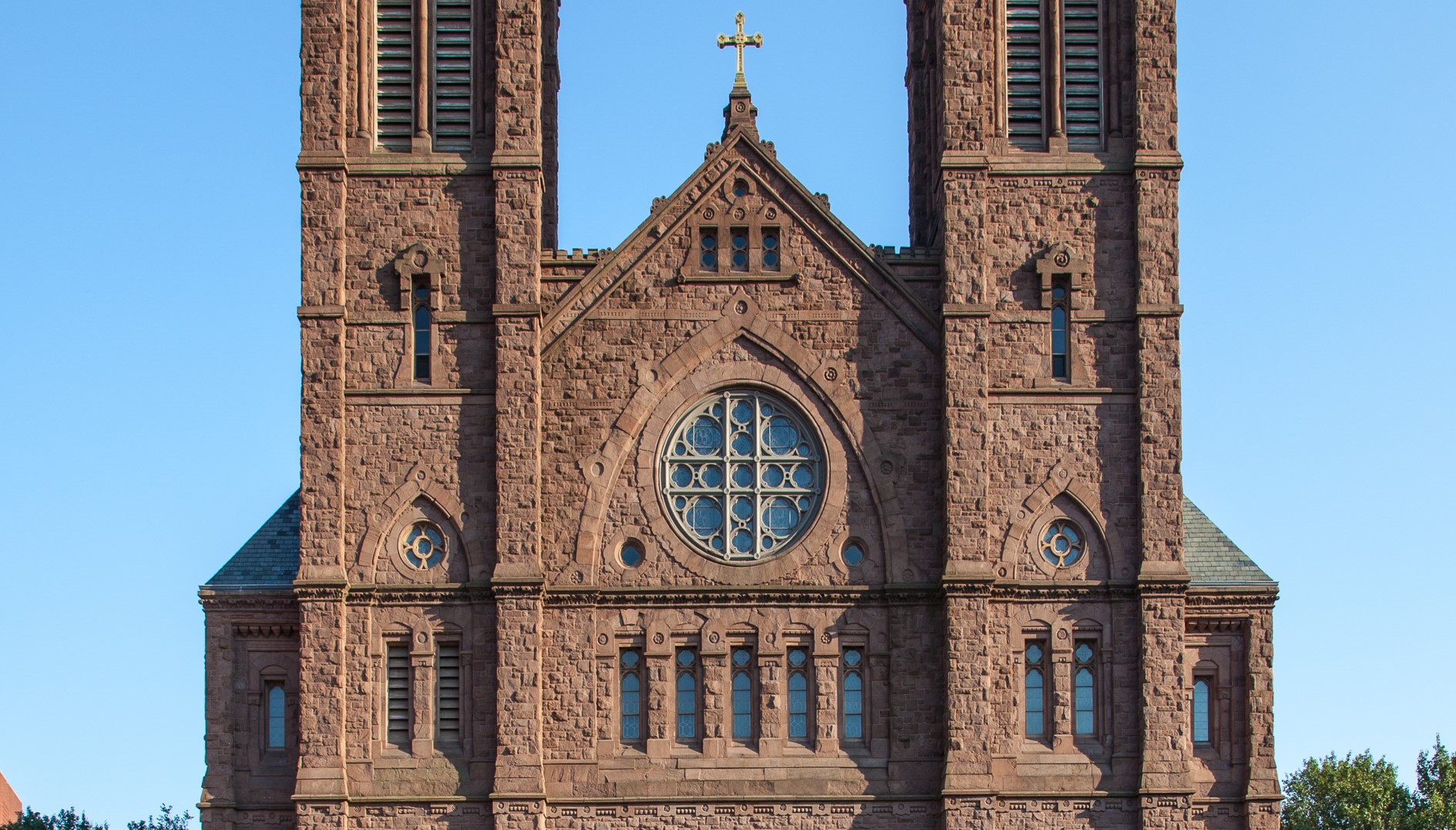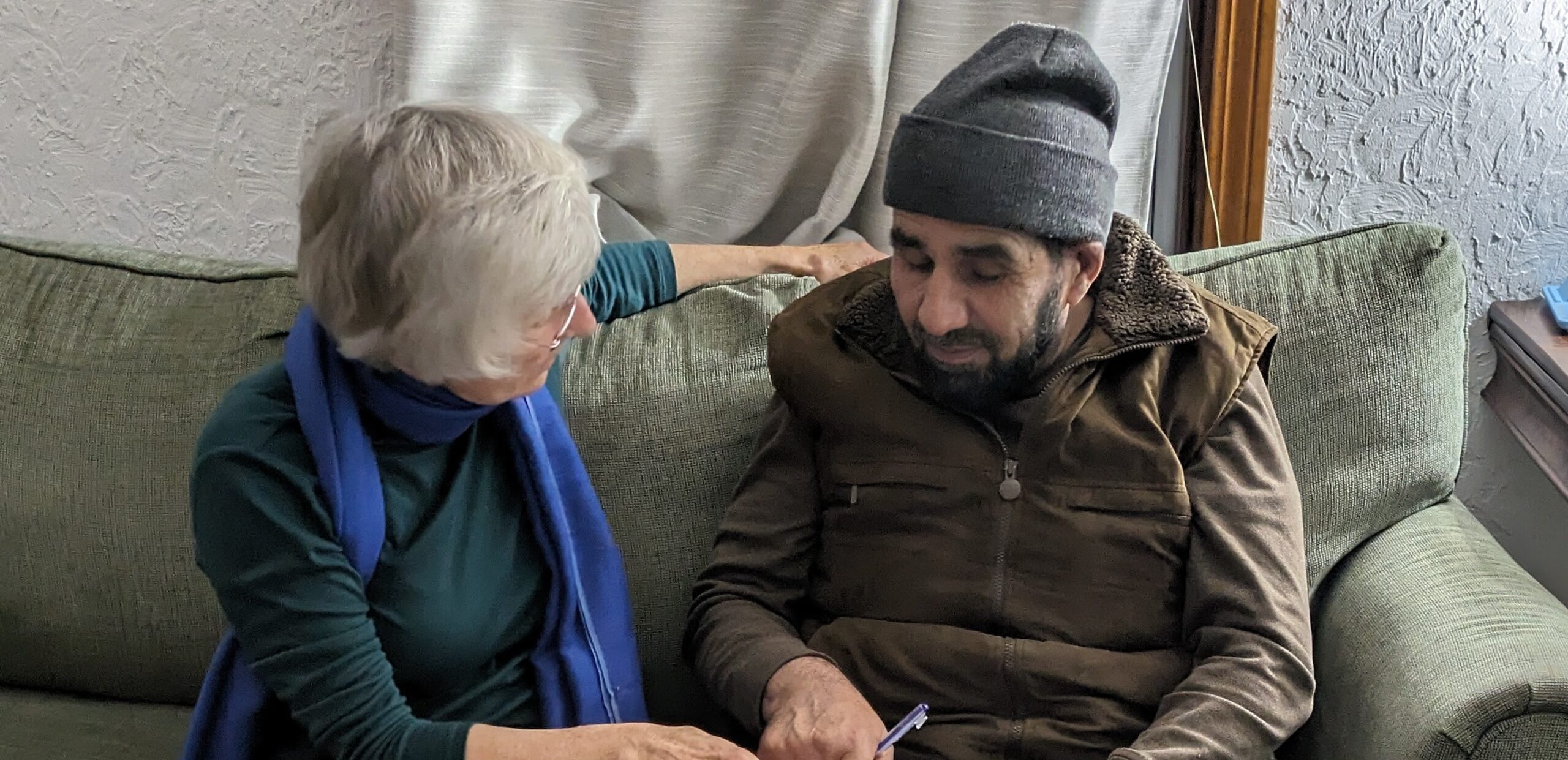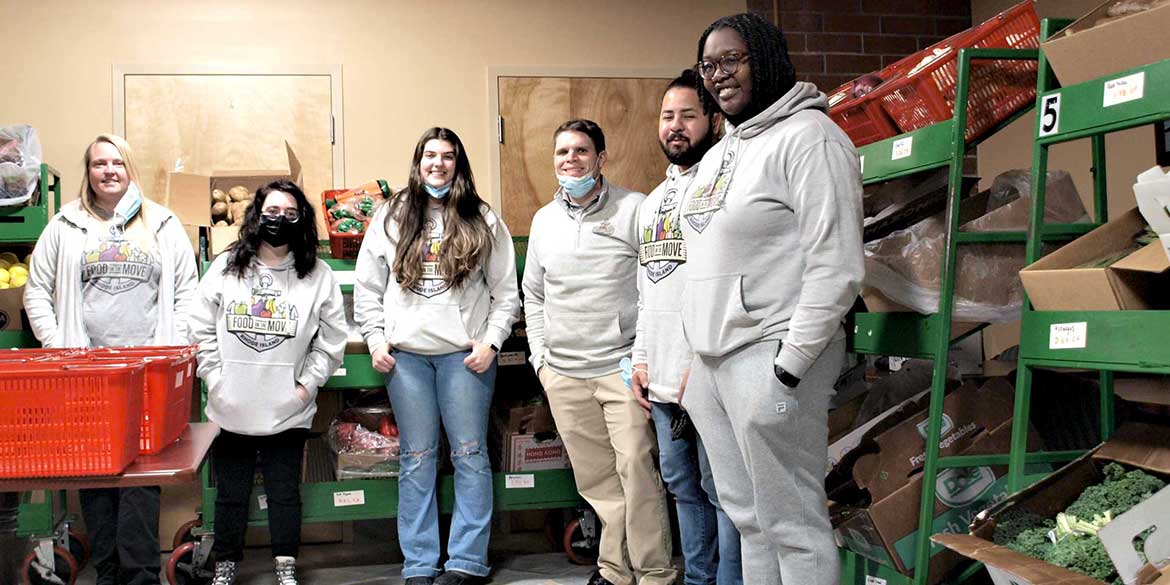‘I think it’s a pendulum; our society is divided and filled with angst now, but I think it will come around’
While she has no single, simple answer about what’s happening with religion in America, The Reverend Dr. Donnie Anderson, the pastor of the Pilgrim United Church of Christ in New Bedford, MA, says, “Many mainline Protestant churches hesitate to aggressively address social justice issues, because of a fear of [creating] disunity.”

That problem, she says, is not new: In the mid-1800s, many Rhode Island-based Baptist churches were silent on the subject of slavery, perhaps because Rhode Island’s textile industry depended on cotton grown on Southern plantations and harvested by slaves. Some congregants of that era asked: How can the church be the church if it’s silent on the most significant social justice issue of our day?
Why are so many Americans walking away from religion?
After serving 13 years as the Rhode Island State Council of Churches’ executive minister before retiring in 2020, Anderson cites our most pressing social justice issues: attacks on bodily autonomy, LGBTQ+ individuals, affirmative action, critical thinking and intellectual freedom, as well as the need for reparations for Black and Indigenous people. Nevertheless, churches must stand up for social justice issues without closely affiliating with any partisan politicians. “Whenever a faith community gets too close to political movements, the faith movement always loses credibility,” says Anderson.
Recalling how people’s perspectives on religion have changed, The Reverend Rebecca Spencer, the longest serving pastor of Central Congregational Church in Providence, says, “In the past, pastors were treated with respect; now, we don’t get that. Young people, some of whom lack curiosity, seem to view religious life as something for old people.”

When she began her pastoral career in 1980, Spencer found that Judeo-Christian religions were much more significant in people’s lives, while people today think they can exist without religion. “We’re children of God, and we have these gifts that have been given to us for generations,” she says. In recent years, “we’ve become very self-centered, [due to] politics, COVID’s isolations and social media. We’ve lost that sense that our ancestors knew what was important.”
Rabbi Jeffrey Goldwasser, of Temple Sinai, a Reform synagogue in Cranston, believes that American society makes it difficult for people to connect with their own spirituality, regardless of their faith tradition. “Faith is very much about patience, and we don’t know what it means to live a life of service beyond ourselves until adulthood,” he says. “With so much noise – social media, demanding work schedules, etc. – it’s easy to ignore our spiritual selves.”
Times – and religious practices – change
A Woonsocket native, Father Marcel Taillon, pastor at St. Thomas More Parish – St. Veronica Chapel, has witnessed enormous changes in Rhode Island’s Catholic communities. “Many of our magnificent Catholic churches were built for immigrants’ language needs. In the Smith Hill area of Providence, a Polish church is across from a French church, which is near an Irish church,” says Taillon, who notes that many Catholics have left the cities for the suburbs, where Catholic churches are flourishing.

In fact, his church, where he leads eight well-attended Masses each weekend, is building an additional 60-space parking lot to accommodate growing demand. In Narragansett, the church draws many tourists.
Years ago, social life revolved around the parish, with social events, dinners and Catholic Youth Organization (CYO) sports, says Taillon, 58, who grew up immersed in the French-Canadian Catholic culture. Woonsocket changed in the ‘80s, when the city took much of the French-Canadian neighborhood by eminent domain. “It was traumatic; we had to leave and eventually we learned English,” he says.
“We don’t have a clear reason to be Jewishly-engaged. For my father’s generation, born in the 1940s, Israel’s existence was the big ‘why’; for my generation, born in the 1960s, social action was the big ‘why’,” Goldwasser asserts. Today, Israel has become a negative for many American Jews, who have diverse social action options. “It’s harder today to show people why the Jewish community can make their lives better.”
Fluctuating membership, fluctuating participation
Even in his flourishing parish, Taillon is witnessing some growing secularism: COVID, weather and high taxes have accelerated some parishioners’ moves to Florida; and families experiencing divorce struggle to continue their children’s religious education. “My heart aches for these divorced families,” says Taillon. “Before and during COVID, sports have become much more important to children, and parents wanted their children outside. When habits change, it’s hard to come back to past practices.”

Early in Pastor Linda Forsberg’s career at First Evangelical Lutheran Church, a small group of very conservative fundamentalist congregants were unhappy with her liberal philosophies and lifestyle; then divorced, she dated an Indigenous man and then a Black man, whom she later married. Too, the Lutheran church had issued a call for full inclusion of LGBTQ+ individuals. “That group of 20 or so people left our church and those who stayed were openly accepting of the LGBTQ+ community, doing interfaith and antiracism work as a community,” says Forsberg, who led the East Greenwich church for 26 years.
While church membership is between 500 and 600 members today, attendance is declining. Thirty years ago, active members attended services each Sunday; now, active members attend once or twice a month. “We don’t see the same group of members every week,” says Forsberg, who stepped down from her post in February 2023.
Like many religious institutions, Temple Sinai has experienced declining membership. “In 2014, when I arrived, people were nostalgically looking back at the congregation in its heyday,” says Goldwasser, “when 300 or 400 families were members, and the synagogue was packed for High Holidays services.”
While Central Congregational is not losing membership, the church finds it harder to recruit new members and attendance is down among existing members, even post-COVID. “People don’t see the importance of engagement,” Spencer says. “Faith brings you through the tough spots; I have faith in God and the better angels of our nature.”
It’s not an exclusively Rhode Island problem; Only 39% of adults surveyed in March 2023 said that religion was very important to them, a marked decline from 1998, when 62% of respondents answered the same way. That national survey was described in an April 2023 column by Jessica Grose, “Lots of Americans Are Losing Their Religion. Have You?” Grose also quotes from a forthcoming book, “Beyond Doubt: The Secularization of Society,”: “In the United States, somewhere between 6,000 and 10,000 churches close down every year,” and are either repurposed or demolished.
More recently, Russell Moore, editor-in-chief of the Christianity Today magazine, and author of a new book, Losing Our Religion: An Altar Call For Evangelical America, explains in a National Public Radio interview that many Christians consider Jesus’ Sermon on the Mount speech “liberal talking points” that are no longer relevant. Moore says, in the August 5, 2023 interview, “[W]hen we get to the point where the teachings of Jesus himself are seen as subversive to us, then we’re in a crisis.”
A longing for spiritual connection still exists

Temple Sinai’s engaged Social Action Committee works to alleviate poverty and hunger and aid immigrants. “I teach Torah with a desire to re-engage people,” says Goldwasser. “Torah serves as a blueprint for living a meaningful and fulfilling life.”
“We’re the same; we all have beating hearts and we all want to have purpose and meaning in our lives. Religion gives us the ability to find what unites us and work together for the common good,” says Spencer, who laments that today, many of us keep dividing ourselves into ever-smaller groups who find it difficult to work toward a shared mission. “We have a God-shaped space inside us and we yearn to fill it.”
Religion has accomplished many more good deeds than bad, including establishing schools and hospitals, and fighting for people who are hungry and unhoused, says Spencer.
“In a strange way, we grew from COVID,” says Forsberg, recalling the state’s shutdown of large inside gatherings just before Holy Week in March 2020. “We weren’t allowed to worship on Palm Sunday or Easter, so we decorated the outside of the church and invited congregants to take palms home.” In COVID, she created a family guide for home-based worship and put her Sunday morning readings and messages online. “Some people stumbled across us online and liked the message,” says Forsberg, who leveraged the church’s beautiful grounds to create a permanent outside worship space. Implementing an online giving program, shortly before COVID, supported the church’s finances.
Anderson cites another challenge: Mainline Protestant religion has become a mostly intellectual exercise, and its services are fairly dull. “Spiritual formation is a real balance between intellectual pursuit and emotions, and allowing that mystical sense to be present,” says Anderson, who talks frequently with young people disengaged from religion. “They long for some connection with the transcendent, but feel their faith is separate from their social justice conscience,” she says. “When they do see the connection, each can nurture the other.”
Millennials and others are disengaged
Taillon – and others of his generation – grew up inspired by sacrifices of doctors, nurses, priests, nuns, and others of service. He’s not seeing that among millennials, many of whom are delaying commitment to the serving professions. “With fewer people practicing religion, then fewer people are hearing the call of God… it’s not a surprise that there are fewer seminarians and fewer nuns.”
Religious education often gets short shrift, says Goldwasser, as parents experience economic challenges, children feel pressured to achieve in sports or other extracurricular activities to get into college, and many young people are disaffected from religious communities. Temple Sinai’s Religious School has experienced a marked decline; in 2014, some 60 students were enrolled; now, 20 students are enrolled.
Thinking outside the box
With a smaller cohort of students, Temple Sinai has pivoted to de-emphasize separate curriculums for each grade, and now engages kids of different ages in Jewish craft and cooking projects. “We want kids to feel great about being Jewish; we tell them it’s their ‘super-power,’ says Goldwasser, who acknowledges that some congregants feel uncomfortable entering a synagogue after 11 worshippers at Pittsburgh’s Tree of Life Congregation were murdered in 2018. “That’s been a challenge, but I don’t think it’s done much to change people’s inner sense of Jewish identity.”
“Every person involved in a community of faith today must admit that the times are changing, across denominations,” says Forsberg. “I feel like organized religion is not as important to the younger generations as it was to my Baby Boomer generation. Those spiritual needs will always be there; the whole climate is changing and we need to do things differently.”
Today, Forsberg leads the 10-year-old Church Beyond the Walls, the street church that two Episcopal priests initiated to minister to the Occupy Providence community. As demand for moral and spiritual support, warm socks, hot coffee and food continued beyond Occupy Providence, the Saturday afternoon services at Burnside Park in Providence are open to all. Many Brown University students – from all faiths and no faith – support our efforts, says Forsberg. “We have a simple participatory worship service, and then a community meal. We help with resources, too, for housing and counseling.”
Looking to the future
“I think it’s a pendulum; our society is divided and filled with angst now, but I think it will come around,” says Spencer. “We’re so interested now in being judgmental, [but] the great leaders – like Lincoln – have a way of being nonjudgmental.”
Acknowledging the tragic sexual molestation scandals that have rocked the Catholic church, Taillon says, “Rhode Island still has lots of Catholic oxygen; the Catholic culture is not gone.”
In all our religious traditions, Anderson believes that worshipping both communally and individually is fundamental. “I don’t know what our institutional settings will be like and how we’ll worship together,” she says. “I wouldn’t be surprised if, in two decades from now, there’ll be a great revival movement. I see the hunger for that in young people.”
Now working fulltime at Salve Regina University in Newport, where she teaches World Religions and is involved with campus ministry, Forsberg is deeply engaged with young people who give her hope. “I see their deep spirituality and commitment to helping others and our planet.”
One question keeps Goldwasser up at night: With fewer rabbis graduating from seminaries and congregants attending services on Zoom, what will synagogues look like 20 years from now? Nevertheless, the self-described “hopeful person” has great confidence in Judaism’s future. As a small percentage of the larger society, the Jewish community’s highly motivated and devoted members will sustain Judaism, says Goldwasser.





